Hiring managers want more than a list of your tasks. They want to see proof that you can grow traffic, boost engagement, and bring in real results. If you’re applying for a digital marketing specialist role, your resume needs to clearly show the value you bring. It’s often your first impression, so it needs to speak clearly and confidently.
In this guide, you’ll learn how to write a resume that stands out. You’ll discover what to include, how to structure each section, and how to highlight your strengths. If you’re starting from scratch or updating your old resume, this guide will help you make it stronger and more effective. Read on!
Sample Digital Marketing Specialist Resumes
Here are several tailored resume examples highlighting various career paths. These include SEO-focused roles, paid media strategists, and email lifecycle marketers. Each follows best practices in structure, ATS optimization, and strategic phrasing.
Digital Marketing Specialist Resume
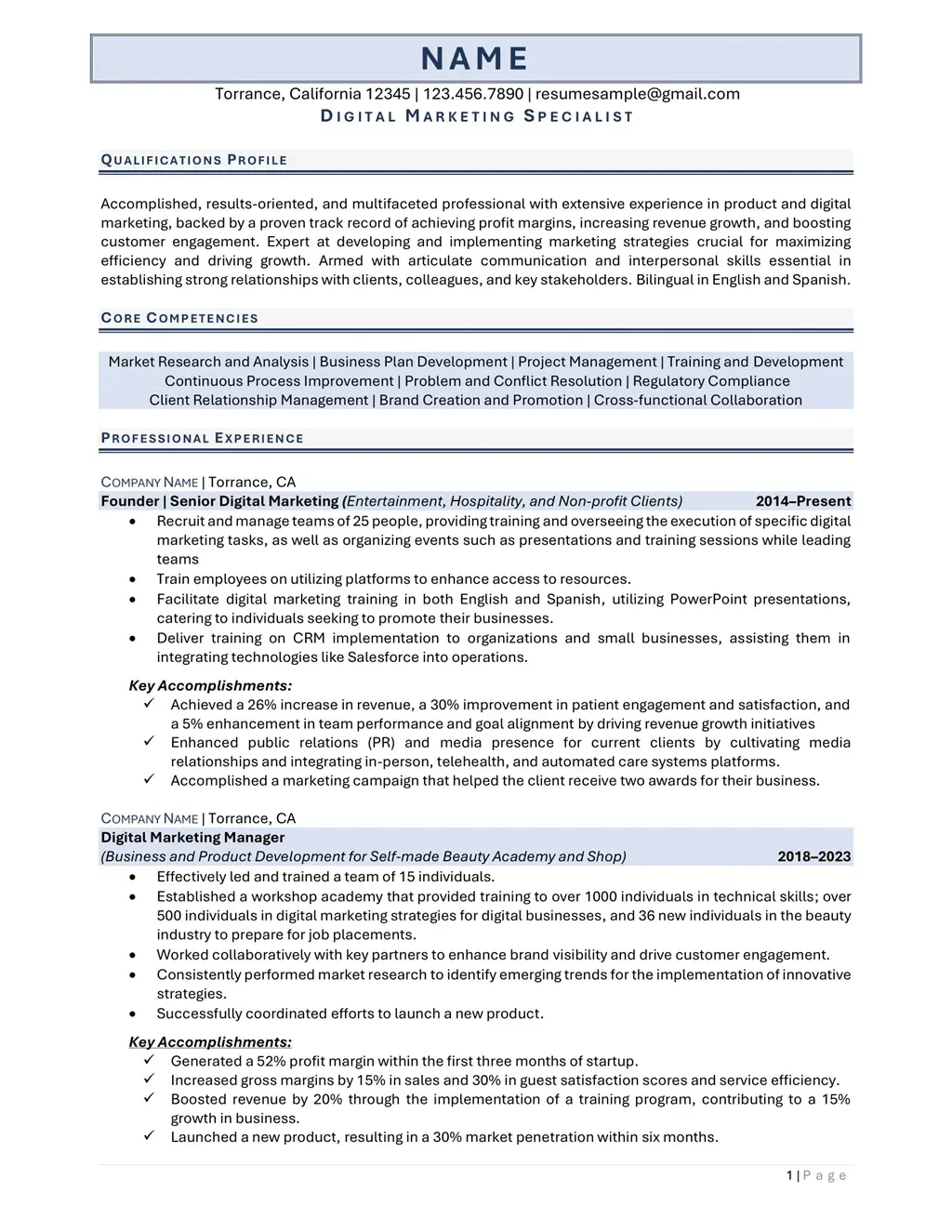
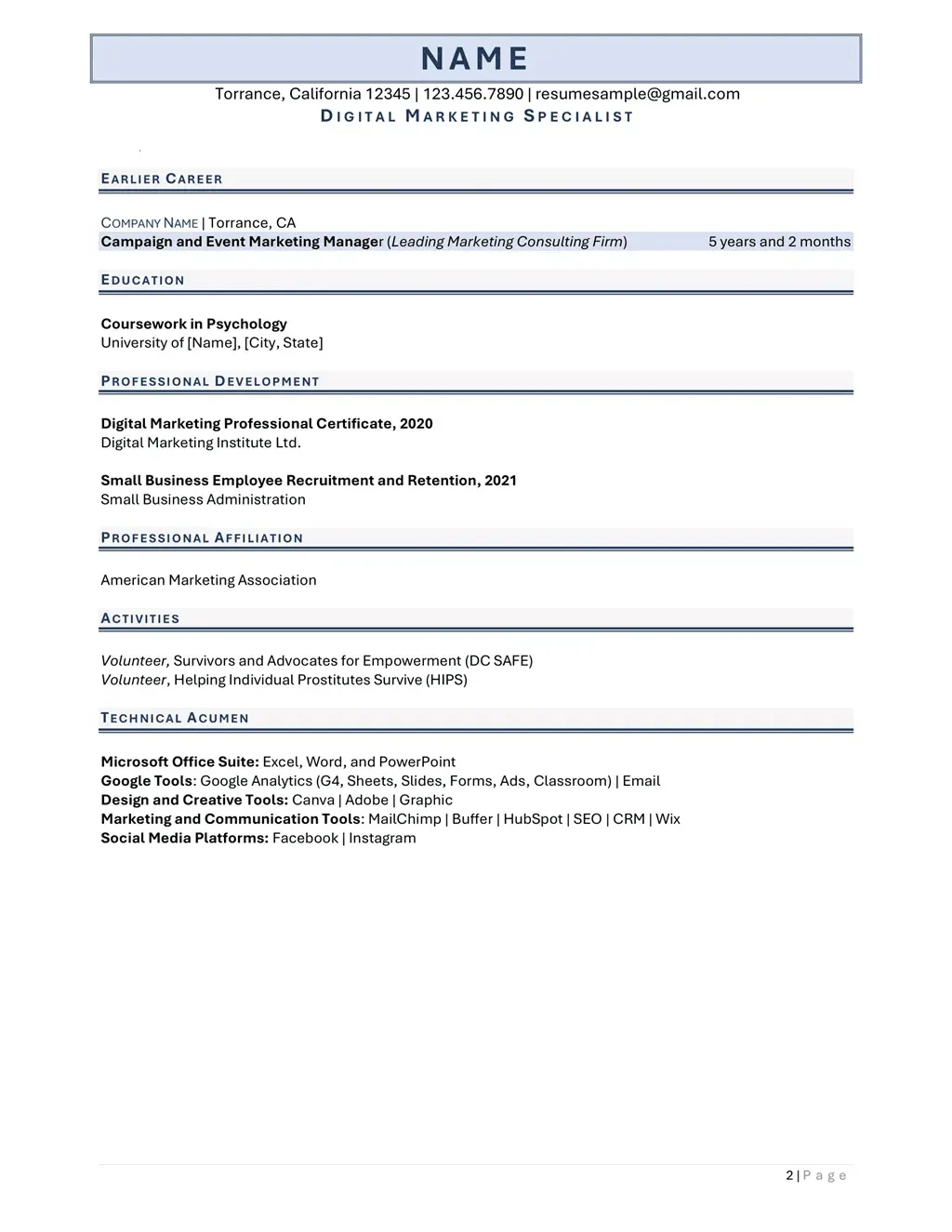
Download your own copy of the digital marketing specialist resume example above.
Director of Digital Marketing Resume
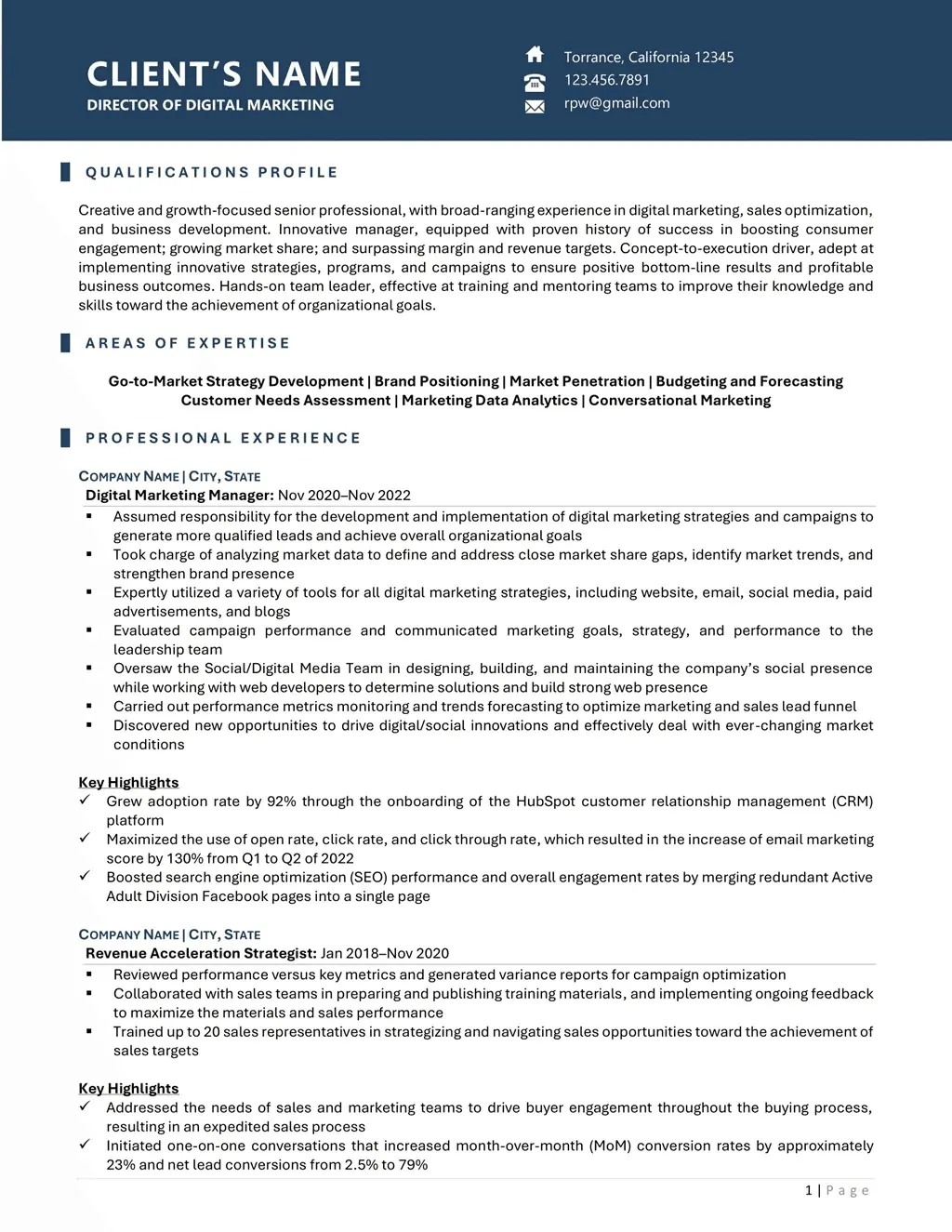
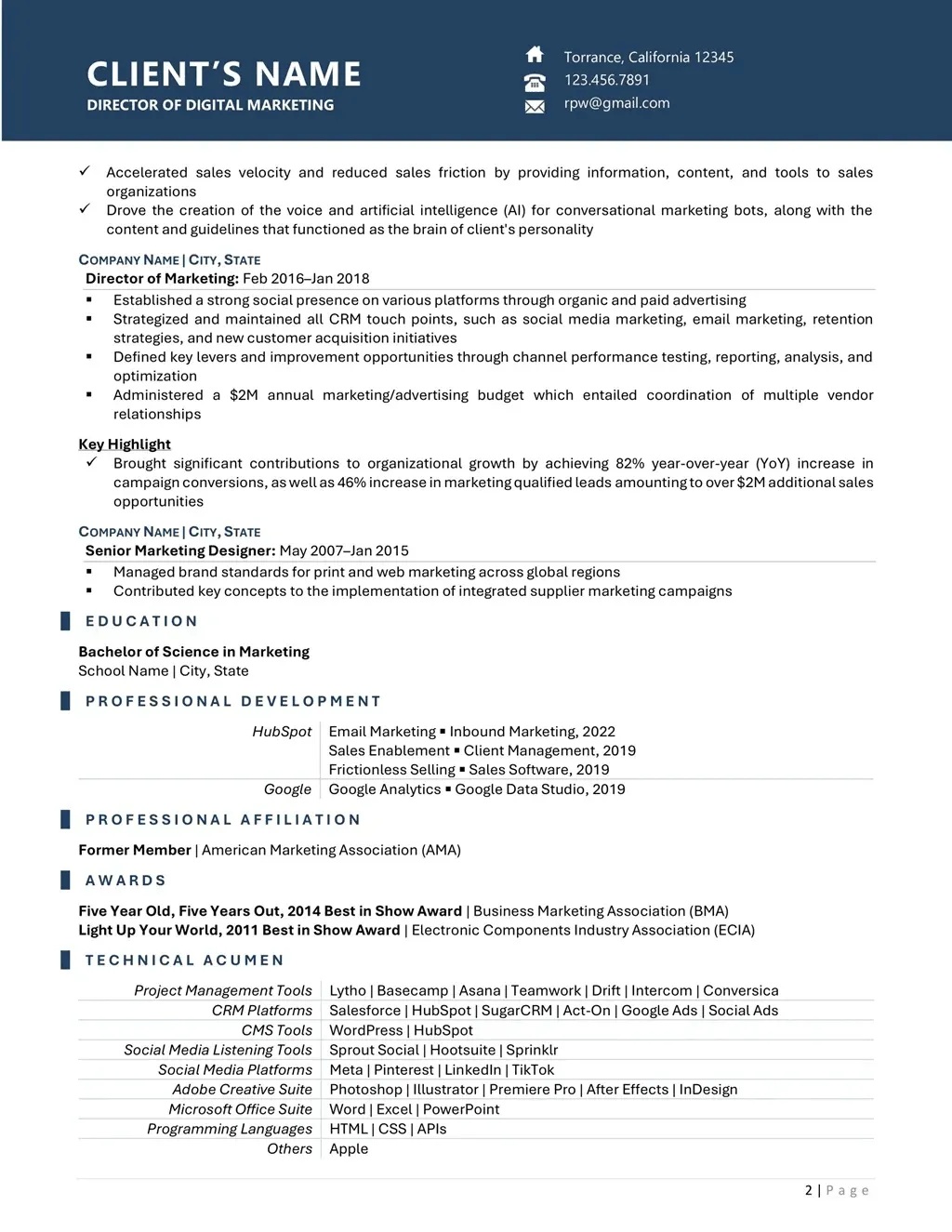
Download your own copy of the director of digital marketing resume example above.
Digital Marketing Director Resume
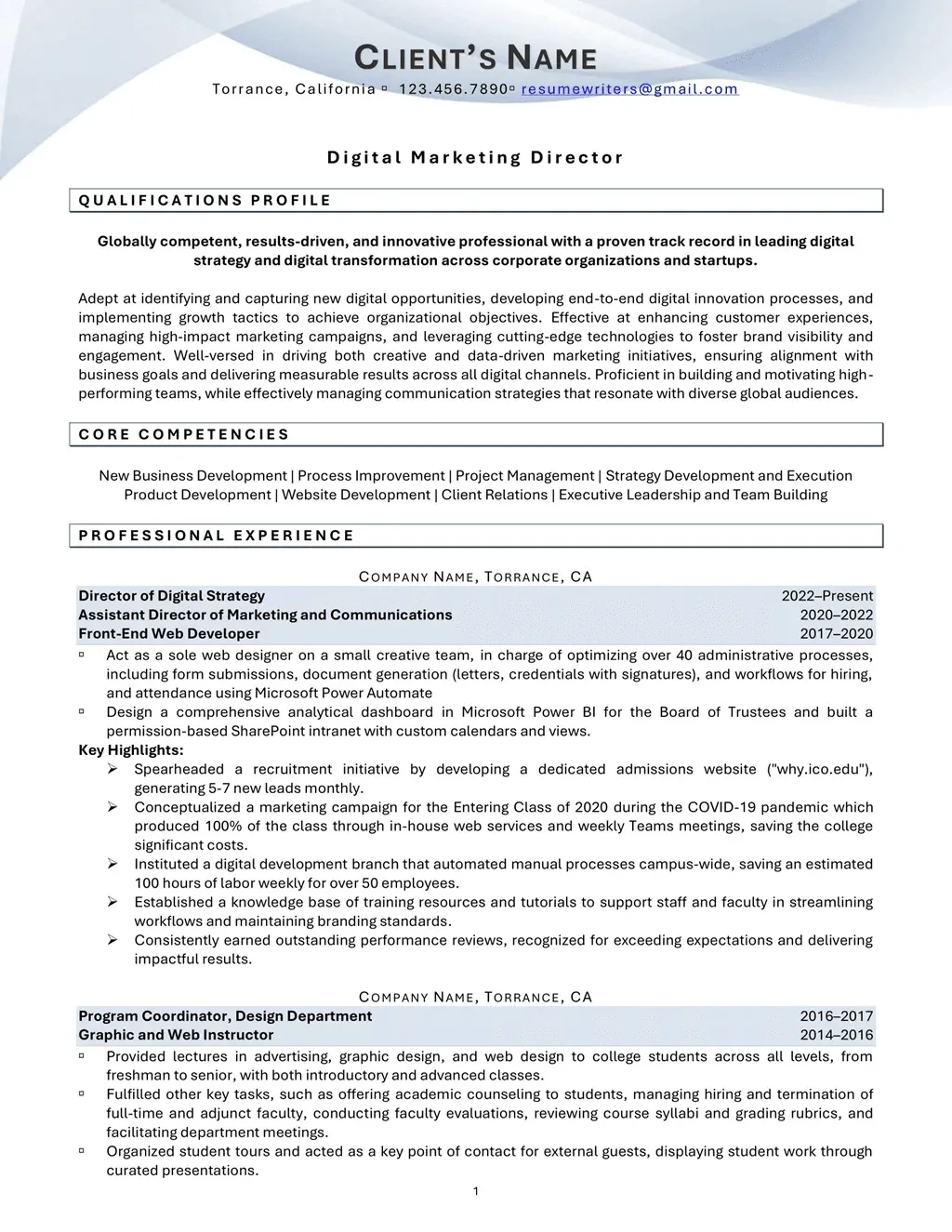
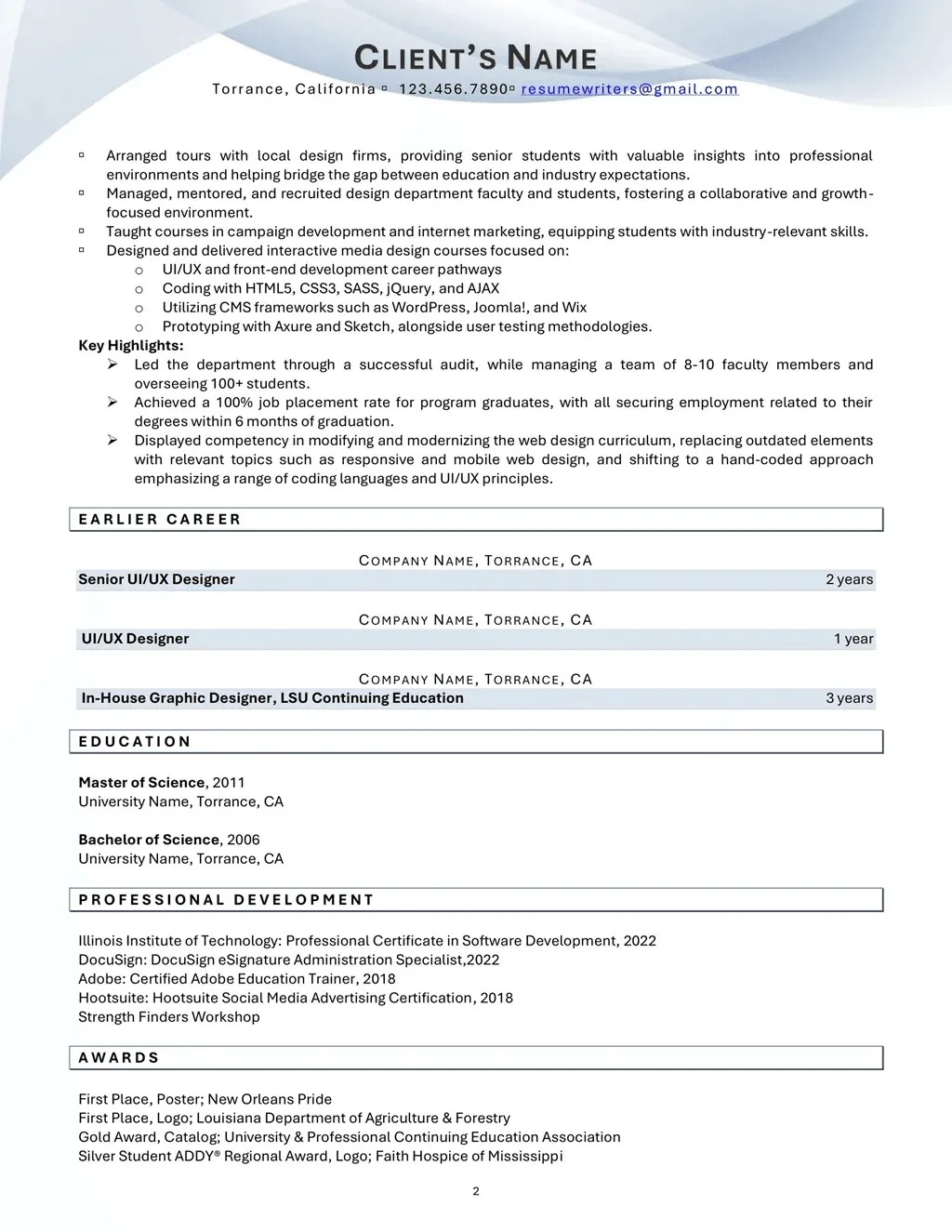
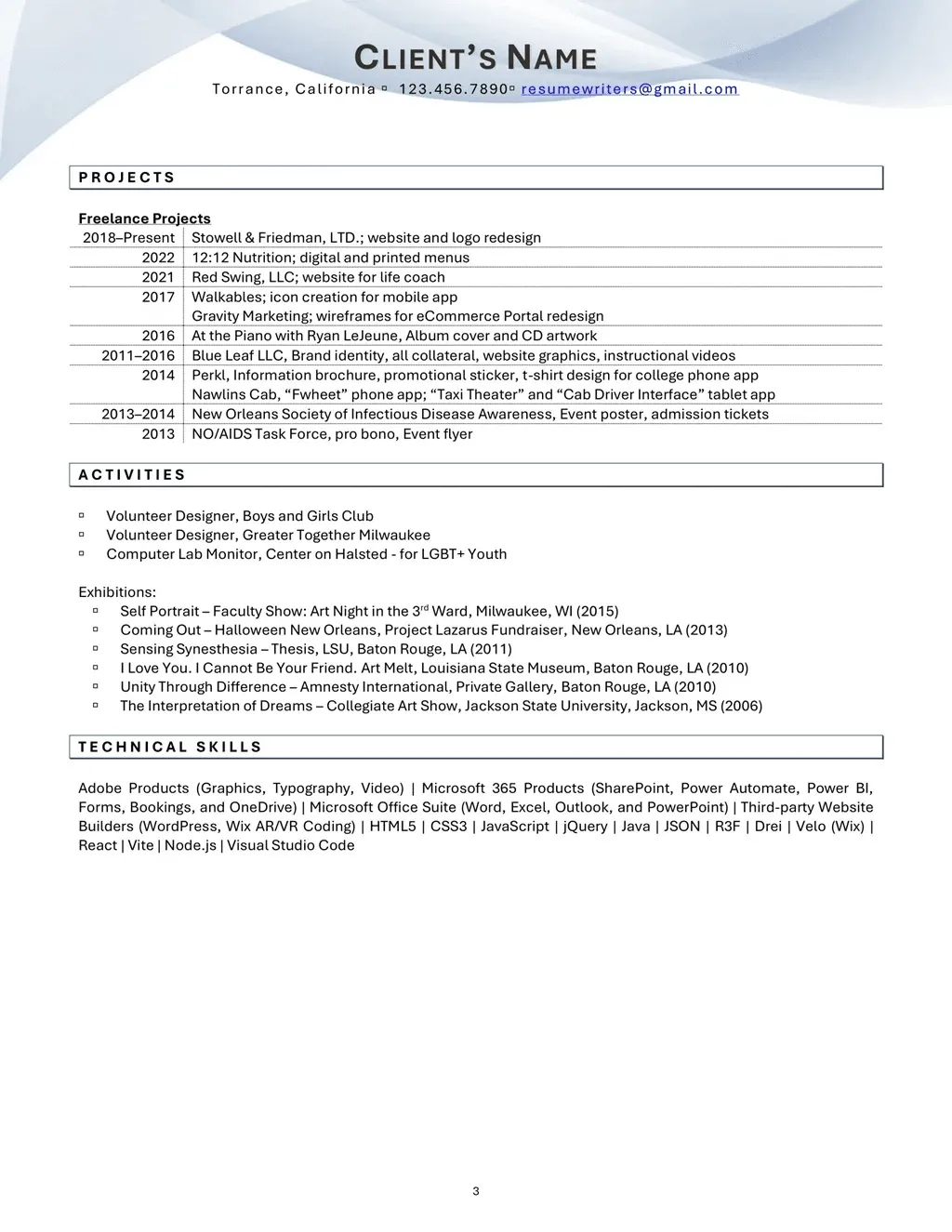
Download your own copy of the digital marketing director resume example above.
Why Your Digital Marketing Resume Is Critical in a Data-Driven Industry
Recruiters and marketing directors receive hundreds of resumes for every open digital marketing role. With only seconds to scan each one, your resume needs to tell a compelling story fast. But this isn’t just about looking good on paper.
As a digital marketer, you’re hired to drive measurable growth. That means your resume must reflect a track record of success, such as lead generation, conversion improvements, ad spend optimization, ROI, or traffic growth. Buzzwords alone won’t cut it. You need data, strategy, and clear impact.
Your resume should function as proof of performance, much like the reports and dashboards you present to clients or stakeholders.
What Hiring Managers and Marketing Leaders Want in a Digital Marketing Specialist Resume
Hiring managers are looking for one thing: Can this person drive marketing results? Here’s what they typically look for in a strong resume:
- Clear Role Positioning: Are you a performance marketer, SEO strategist, or lifecycle marketing expert? Being specific with your role helps recruiters match you better.
- Performance Metrics: Quantify success using industry-standard KPIs like CTR, ROAS, CAC, or organic traffic growth.
- Channel Expertise: Demonstrating fluency across multiple platforms, from Google Ads to TikTok campaigns, can give you an edge.
- Tool Proficiency: Knowledge of GA4, Meta Ads Manager, HubSpot, SEMrush, or Klaviyo shows you’re equipped for today’s marketing stack.
- Strategy and Funnel Understanding: Employers value candidates who understand customer journeys and know how to tailor marketing efforts across TOFU, MOFU, and BOFU stages.
- Testing and Optimization: Whether through A/B tests or multivariate testing, your ability to refine campaigns through data is critical.
Resume Format and Structure for a Digital Marketing Specialist
Your resume should be easy to read and compatible with applicant tracking systems (ATS). Here’s how to format yours for maximum impact.
1. Contact Information
Start with the basics. Your contact details should be accurate, updated, and professional.
Include:
- Full Name
- Phone Number
- Professional Email Address
- LinkedIn Profile (using a custom URL looks cleaner)
- Portfolio or Personal Website (this is a great way to showcase your work)
Tip: Choose a modern, easy-to-read font like Arial or Calibri. Skip full mailing addresses or photos unless they’re specifically asked for.
2. Professional Summary
This is your elevator pitch. It goes right at the top and should sum up your role, key digital marketing skills, top accomplishments, and the tools you’re confident with. Tailor it to each job you’re applying for.
Example:
Performance-driven Digital Marketing Specialist with over 6 years of experience in SEO, PPC, and conversion rate optimization. Managed six-figure ad budgets and consistently delivered up to 8x return on ad spend. Highly skilled in tools like GA4, Meta Ads Manager, and HubSpot, with a strong focus on testing and tracking performance metrics that lead to growth.
Make this section count. It’s often the first thing recruiters read, so use it to quickly show how you can solve their problems.
3. Core Competencies / Areas of Expertise
Group your skills into relevant categories. This not only keeps your resume clean but also helps recruiters quickly see where your strengths lie.
Digital Advertising
- Google Ads (Search, Display, Shopping): Experience in building and managing high-performing campaigns.
- Meta Ads (Facebook, Instagram): Skilled at creating targeted ads that drive conversions.
- LinkedIn Ads: Strong understanding of B2B targeting and messaging.
- Programmatic Buying: Familiar with data-driven ad placements across various platforms.
SEO & Analytics
- On-Page/Off-Page SEO: Improved organic rankings through strategic optimization.
- Technical SEO: Able to conduct audits and fix indexing issues.
- GA4, Google Tag Manager: Set up advanced tracking and event-based reporting.
- SEMrush, Ahrefs, Moz: Proficient in using tools for keyword research and competitor analysis.
- Keyword Strategy & Optimization: Developed content plans that led to significant traffic growth.
CRM & Email Marketing
- HubSpot, Mailchimp, Klaviyo: Built and managed email campaigns for different buyer journeys.
- Drip Campaigns: Automated outreach based on user behavior.
- Segmentation and Personalization: Delivered more relevant content through targeted lists.
- Lifecycle Email Strategy: Created email flows that improved engagement and retention.
Content & UX
- WordPress, Webflow: Comfortable building and editing landing pages.
- Landing Page Optimization: Used testing and heatmaps to improve user flow.
- CRO and A/B Testing: Identified winning variations through structured experiments.
- UX Copywriting: Wrote user-friendly content focused on conversions.
4. Work Experience
Highlight the impact of your work. Use reverse-chronological order and write strong, results-focused bullet points. Include specific outcomes to make your achievements clear.
Example:
Digital Marketing Specialist
ABC Tech Group – New York, NY | Jan 2021 – Present
- Designed and launched omnichannel campaigns across Google Ads, Facebook, and LinkedIn that brought in consistent traffic and averaged a return on ad spend of 6.8.
- Improved SEO performance by boosting the rankings of 15 key keywords, which led to a 92% increase in monthly organic traffic.
- Built automated email workflows in HubSpot for lead nurturing, resulting in a 20% improvement in converting marketing-qualified leads to sales-qualified leads.
- Created and tested more than 30 landing page variants through A/B testing, which increased conversion rates by 17%.
- Integrated GA4 and Google Tag Manager to improve event tracking and build more accurate marketing dashboards.
Pro Tip: Focus on what you achieved, not just what you did. Begin each point with an action verb like “increased,” “optimized,” or “created.”
5. Education
Your educational background should reflect your qualifications in marketing, communications, or any related field. If your degree isn’t directly related, mention relevant coursework or projects.
Example:
- B.S. in Digital Marketing – San Diego State University, 2019
- B.A. in Communication – University of British Columbia, 2017
6. Certifications
Certifications help you stand out and show that you stay up to date in a fast-moving industry.
Recommended Certifications:
- Google Ads Search or Display Certification
- Google Analytics 4 Certification
- HubSpot Inbound or Email Marketing Certification
- Meta Blueprint Certification
- SEMrush SEO Toolkit Certification
- Klaviyo Academy Certification
- LinkedIn Marketing Strategy Certification
Tip: Make sure your certifications are current. If they’re available online, include links so hiring managers can view them easily.
7. Projects or Freelance Work
This section adds more credibility to your resume, especially if you’re transitioning careers, freelancing, or just starting out. Treat each project like a mini case study.
Example:
Ecommerce PPC Audit – Freelance Project
- Completed a full audit for a Shopify-based ecommerce brand spending $10,000 monthly on ads.
- Found underperforming keywords and adjusted targeting, which reduced the cost per click by 28%.
- Suggested a smarter budget split based on performance data, helping the client increase profit margins by 19%.
Show what you worked on, the tools you used, and how your work made a difference.
Common Resume Mistakes Digital Marketers Make
Avoiding these pitfalls can be the difference between landing an interview or getting passed over. Here are six frequent resume mistakes digital marketers often make—plus how you can fix them with clear, results-driven strategies.
1. Writing Generic Job Descriptions
Mistake: “Managed SEO for company website.”
Why It’s a Problem: This kind of statement doesn’t show the impact you made. Employers want to see how your work contributed to growth or performance.
Better: “Boosted organic traffic by 110% in six months by fixing technical SEO issues and optimizing blog content through keyword clustering.”
2. Overloading Your Resume with Keywords
Mistake: Stuffing your resume with tools and buzzwords just to get past automated filters.
Why It’s a Problem: It makes your resume sound unnatural and distracts from your actual accomplishments.
Better: “Used HubSpot to design segmented email campaigns that improved open rates by 26%.”
3. Listing Tools Without Context or Outcomes
Mistake: “Proficient in SEMrush, Ahrefs, GA4.”
Why It’s a Problem: Anyone can list tools. What matters is how you used them to drive results.
Better: “Conducted backlink audits using SEMrush, contributing to a 32% increase in domain authority within three months.”
4. Using Outdated or Irrelevant Terminology
Mistake: Mentioning Universal Analytics or focusing on metrics like impressions without further context.
Why It’s a Problem: Digital marketing moves fast. Using outdated tools or terminology can make you seem behind the curve.
Better: “Tracked user engagement through GA4 and evaluated campaign success based on ROAS and time-on-site metrics.”
5. Ignoring Mobile and UX Metrics
Mistake: Only talking about traffic volume or clicks without showing awareness of mobile experience or design impact.
Why It’s a Problem: Today’s marketing strategies rely heavily on mobile performance and user experience.
Better: “Redesigned landing pages for mobile-first indexing, reducing bounce rate by 24% and increasing mobile conversions by 31%.”
6. Skipping Freelance or Side Projects
Mistake: Leaving out contract, freelance, or side work because it wasn’t part of a full-time job.
Why It’s a Problem: Freelance projects reflect adaptability and initiative—skills that are valuable in any digital marketing role.
Better: “Managed a short-term freelance project for an online retailer, optimizing Meta Ads and achieving a 4.5x return on ad spend.”
Tip: Don’t downplay side gigs. Treat them as real case studies by highlighting objectives, tools used, and results.
How to Tailor Your Resume for Each Digital Marketing Role
One resume doesn’t fit all. Every digital marketing job has its own set of priorities—and hiring managers want to see how well you align with their specific needs. Tailoring your resume for each role shows attention to detail and increases your chances of landing an interview.
Here’s how to do it in five smart steps:
1. Match the Job Title
If the role you’re applying for is titled “Performance Marketing Specialist,” and your last job had a different but similar title like “Digital Marketing Manager,” consider adjusting it slightly (if accurate) or using the same phrase in your summary and experience section.
2. Adjust the Skills Order
Your skills section should reflect the priorities of the job posting. If you’re applying for a content marketing role, don’t list paid media or affiliate marketing first. Lead with content-related skills such as SEO, keyword research, content strategy, and copywriting.
3. Edit Your Summary
Your professional summary is your elevator pitch. Customize it to reflect the language used in the job description. If the company emphasizes data-driven campaigns or a passion for eCommerce, mirror that wording to show you’re already aligned with their goals.
4. Feature the Right Metrics
Metrics make your experience more credible—but they only work if they’re relevant. If the job description prioritizes lead generation, highlight campaigns that boosted leads, reduced CPL, or improved conversion rates. Save your brand awareness stats for roles that emphasize top-of-funnel success.
5. Reorder or Remove Irrelevant Experience
Not every role you’ve held needs to take up space on your resume. If you’ve had multiple roles and one isn’t relevant to the job you’re applying for, either shorten it or move it further down. Put the spotlight on experience that’s directly connected to the role—especially if it includes similar responsibilities, industries, or tools.
Cover Letter: Bonus Tool for Digital Marketers
Although often considered optional, a well-crafted cover letter can be a powerful addition to your application—especially in the competitive field of digital marketing. It gives you the opportunity to go beyond the resume and make a more personal, compelling case for why you’re the right fit.
Use your cover letter to:
- Express genuine enthusiasm for the brand or product
- Explain career transitions, gaps, or role changes
- Emphasize alignment with company culture and values
- Highlight a key campaign or success story that isn’t in your resume
- Explain why you’re applying for this particular role right now
- Clarify how your blend of skills meets the role’s unique demands
Do You Need a Portfolio? Yes, and Here’s Why
In digital marketing, your results speak louder than your resume. A portfolio lets you show—not just tell—what you’ve accomplished. It highlights the value you bring through campaign snapshots, landing pages, email flows, strategy decks, and SEO audits. Even redacted analytics dashboards and A/B test results can give insight into how you track performance and make data-driven decisions.
What you include should reflect the roles you’re targeting. For example, if you’re applying for a content role, highlight blog posts, newsletters, and keyword strategies. For performance marketing roles, showcase paid ad creatives, funnel breakdowns, or ROAS-focused reports. Add a short explanation for each project to give context and emphasize your contribution.
As for where to host it, choose platforms that are clean and easy to browse. Notion, Webflow, WordPress, Behance, or even a well-organized Google Drive can all work. A strong portfolio positions you as a professional who understands the power of storytelling, strategy, and results—exactly what employers are looking for.
Need Help Crafting the Perfect Digital Marketing Specialist Resume?
Struggling to highlight your skills and achievements? Let our expert resume writing service create a tailored, results-driven digital marketing specialist resume that stands out to hiring managers. With our deep understanding of digital marketing trends and ATS optimization, we’ll help you showcase your proven track record and land your dream job.
Get started today and take the next step in your digital marketing career with confidence!
Frequently Asked Questions
Should I include certifications on my resume, and where should they go?
Yes, especially if they’re relevant and from recognized platforms like Google, HubSpot, or Meta. Place them in a separate “Certifications” section near the bottom of your resume, or under your “Skills” section if you’re short on space.
How many pages should my digital marketing resume be?
Keep it to one page if you have under 7 years of experience. Two pages are acceptable for more seasoned professionals, especially if you’ve held multiple roles or have extensive project results worth showcasing.
Is it okay to add freelance or side projects?
Absolutely. If they’re relevant to digital marketing, list them under a “Freelance Projects” or “Additional Experience” section. Highlight outcomes and client results just as you would for a full-time role.
Can I include links on my resume?
Yes, and you should. Add hyperlinks to your portfolio, LinkedIn profile, or published articles. Just make sure the URLs work and don’t clutter the layout.
How do I list soft skills without sounding generic?
Avoid listing soft skills in a vacuum. Instead, show them in context. For example, rather than saying “good communicator,” write “collaborated with sales and design teams to launch a multi-channel product campaign.”








